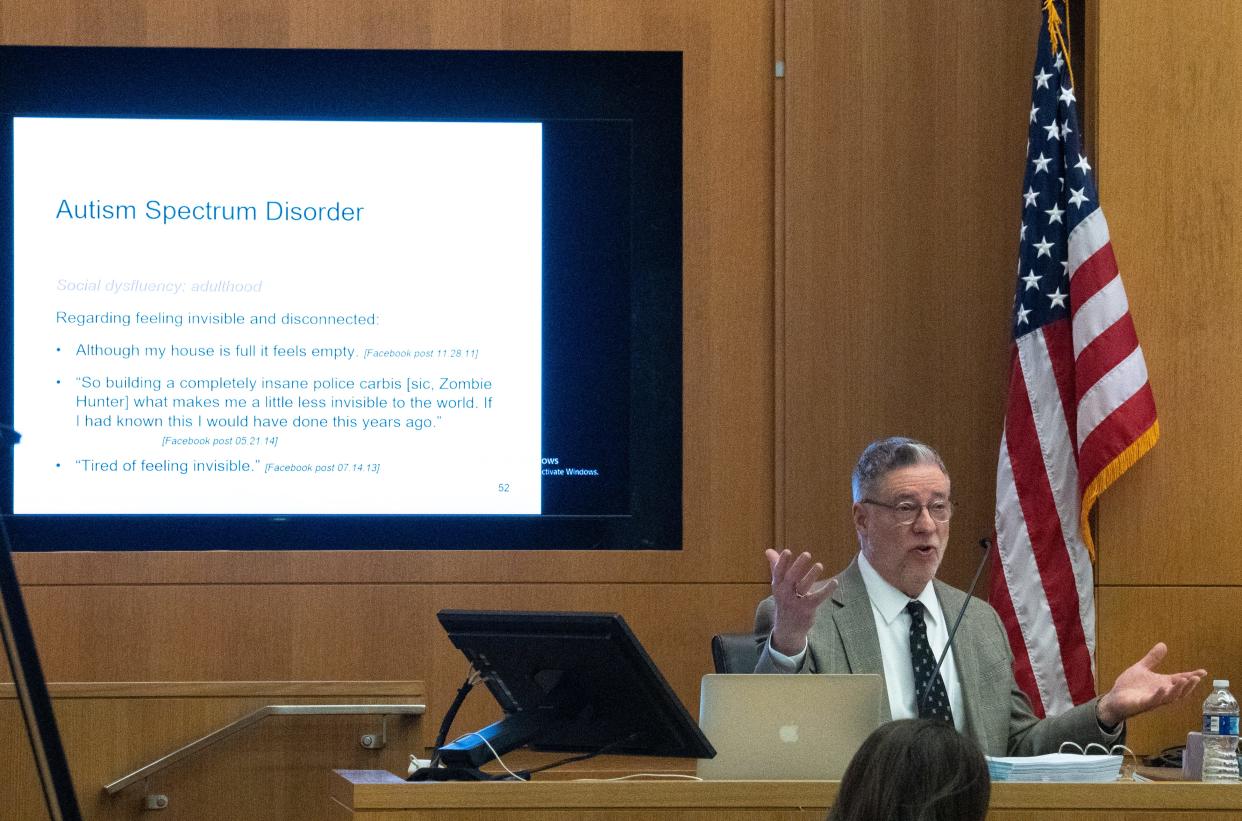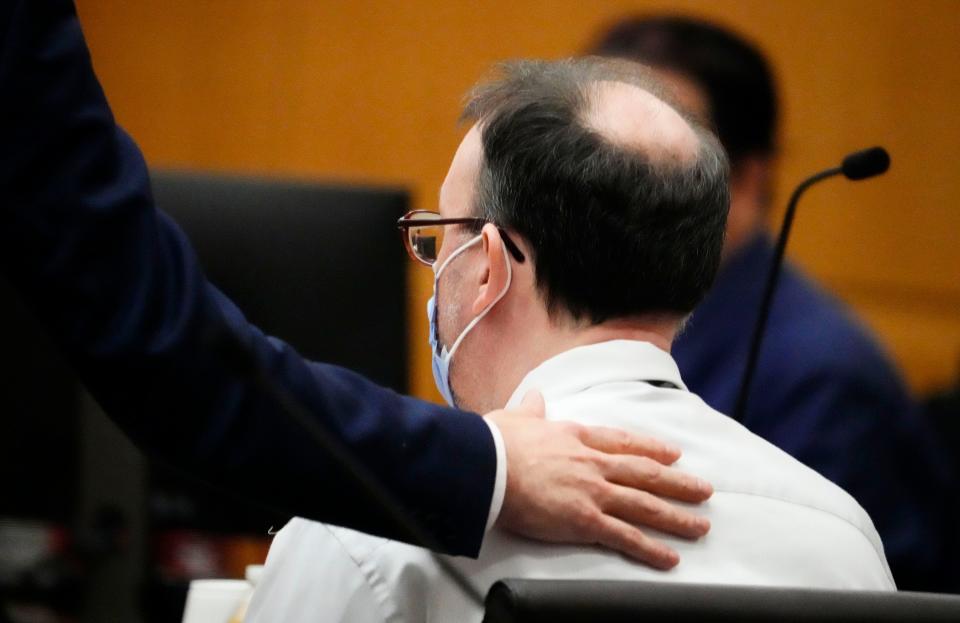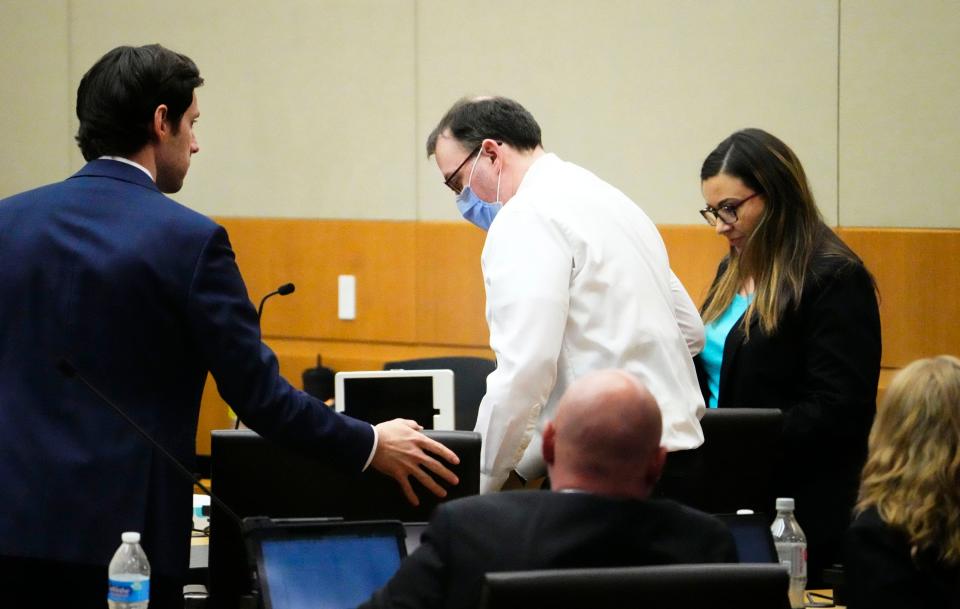'Canal killings': Expert's autism diagnosis questioned by state under cross-examination

The man on trial for the so-called Phoenix "canal killings" was able to understand sarcasm, carry on a conversation with anyone and make good eye contact, according to accounts by adults who knew him when he was a teenager, an expert witness has said under cross-examination.
Dr. Mark Cunningham spent eight days in the double murder trial laying out his theory that Bryan Miller, charged with killing two young women in Phoenix in the early 1990s, fits the bill for a finding of not guilty for reasons of insanity.
The forensic psychologist said Miller was in the grip of a dissociative "trauma state" at the time of the murders, and so affected by his autism spectrum disorder and general immaturity that he did not understand that what he was doing was wrong.
His conclusions, methods and expertise came under attack in an often testy, three-day-long cross-examination by state prosecutor Juli Warzynski.
One person Cunningham cited as he laid out his belief that Miller is autistic was Leslie Swanson, a speech and language pathologist who taught Miller in a class for emotionally handicapped and intellectually disabled students at Goldwater High School when he was around 14 or 15.
Cunningham testified that Swanson said Miller had "a difficult time putting things together" and would fundamentally misperceive what people said to him, thinking a simple greeting was intended as an insult.
This week, Warzynski asked Cunningham about other comments made by Swanson in which she reported Miller was able to hold a conversation and looked her in the eye.

"He understood sarcasm and he could read between the lines. He knew things had more than one meaning," Swanson said about Miller in a pre-trial interview with prosecutors. Cunningham agreed he did not include this line in his testimony.
He also agreed Miller's former stepfather had described the then-teenager as able to "carry on a conversation with anyone," and that a treatment plan from Miller's stay in a juvenile facility made no mention of an autism diagnosis.
When questioned again by the defense, Cunningham said high-functioning autism didn't mean a person could never have a conversation or look anybody in the eye.
"But instead, the quality of relationships that you can develop is deficient as compared to non-autistic, what we would call neurotypical normal people in the community," he said.
Diagnoses are central to defense
The state is seeking the death penalty in its case against Miller, who is charged with murdering and attempting to sexually assault Angela Brosso in November 1992 and Melanie Bernas in September 1993.

Brosso was 21 when she was murdered and beheaded, her body found near the apartment she shared with her boyfriend near Cactus Road and Interstate 17. Bernas, 17 and a high school student, was killed in September 1993. Both are believed to have been riding along Phoenix canals when they were attacked.
The two murders were linked through forensic evidence and became known as the "canal killings." The case went cold for two decades before new DNA analysis in 2015 led to Miller's arrest.
Miller's twin diagnoses of autism spectrum disorder and dissociative disorder are central to his insanity defense. His attorneys must prove he had mental disorders that left him unable to comprehend his actions at the time of the murders, now 30 years ago.
Cunningham said to his knowledge Miller had not been formally tested for autism and that he did not believe there was a "gold standard" test for diagnosing autism in adults.
He had also referenced Miller's poor personal hygiene in his late teens and early adulthood as evidence of his autism.
Warzynski took him to a statement from a man who described Miller back then as cycling a lot in the Phoenix summer and not always having a chance to shower, as well as not having any air conditioning in his unit.
The state took aim at the credibility of a woman who knew Miller as a child in Hawaii, and whose observations played a significant role in Cunningham's testimony about Miller having autism and various other disorders.
Cunningham said he was aware the woman had claimed in a statement that she had flown to Alaska in a bid to kill her son's wife after the wife had stabbed her son in the back.
He had taken that into account when judging her credibility, Cunningham said.
State asks about expert's opinions
Despite "compelling" DNA evidence, Miller denies killing Brosso and Bernas and says he has no memory of doing so, Cunningham said.
He testified earlier in the trial that if Miller had slipped into a dissociative trauma state — a walled-off part of his consciousness that he unknowingly created to deal with childhood abuse from his mother — it was possible his "normal state" would have no memory of what happened.
In 1989, when he was 16, Miller stabbed a woman at Paradise Valley Mall. The trial has included evidence that he recalls this incident and said it felt like somebody else was moving the mouse on a computer.
Under cross-examination by Warzynski, Cunningham agreed that when detained by police shortly after, Miller denied stabbing the woman or knowing anything about the knife used.

He also agreed Miller had been wearing red sweatpants and a blue jacket when he stabbed the young woman, and black shorts and a black t-shirt when he was apprehended by police.
He said it was correct that Miller had told police the stabbing gave him "chills up his spine," and that when an officer asked if he stabbed her to see what it felt like, Miller had replied: "Yes, I guess that’s why I did it.”
Cunningham testified extensively about Miller's relationship with his mother Ellen.
She had failed to observe normal sexual boundaries around her son, Cunningham said, exposing him to sexual and violent material and involving him in her sexuality by putting softcore porn on the TV and watching it in a T-shirt and panties.
The combined effect of her abuse had led to Miller fusing eroticism with violence at a young age, developing a disturbed sexuality, he testified. He said he had not included any peer-reviewed studies or literature in his presentation to the court to support the fusion theory.
He said Miller had denied to him having violent fantasies or erotic fantasies about his mother.
Cunningham's testimony continues on Thursday.
This article originally appeared on Arizona Republic: State questions expert's opinions in 'canal killings' trial

